
We are reader-supported and may earn a commission on purchases made through links in this article.
Hostels are a brilliant concept if you’re looking for an affordable place to sleep at night during your world travels. They’re ideal for young people, budget travelers, and those looking for last-minute accommodations.
I’ve spent my fair share of time in hostels (specifically in Europe) and here is my advice for not only surviving in them but thriving in them. It all comes down to doing thorough research ahead of time, creating your own “space” within a room full of strangers, and being open to new experiences and people.
In this article, I’ll be covering types of hostels, what to bring, basic etiquette and expectations, and how to make the most out of your experience.
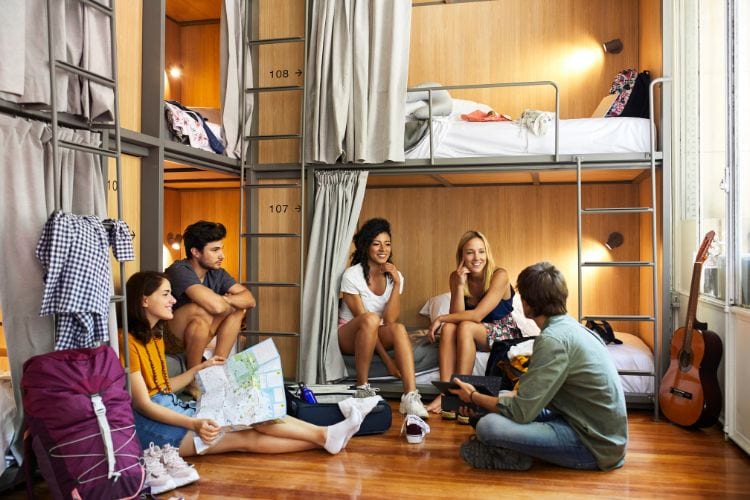
Types of Hostels
Hostels come in all shapes and sizes but all of them ideally have everything you would need: a bed, a bathroom, and basic facilities. Some hostels have bars, lounges and restaurants in addition to hosting weekly or daily events. Some encourage building friendships and promoting social activities while others prioritize a quiet night’s sleep for their visitors.
The Party Hostel
As a solo female traveler, I was really suspicious of party hostels. I wasn’t sure what the dynamic or culture would be. I didn’t know if people came with friends or if most would be solo travelers. When I arrived at OneFam Les Corts in Barcelona, I was immediately intimidated by the energy circulating in the lobby. Coming from France, where people are traditionally more closed off, Spain offered a vibrant rowdy vibe that was a total contrast.
I had been staying in a variety of hostels prior to my visit to OneFam and my experience consisted of limited social interactions and people keeping to themselves. As an introvert, I appreciated this, but part of me was curious about the social element, hence why I booked a party hostel. I wasn’t quite sure what I should’ve expected.
What Party Hostels Offer
Right when I arrived, I was debriefed by the chipper receptionist. My wrist was grabbed as I got a wristband clamped on, something none of the other hostels did. I wasn’t quite sure what the purpose was for that at the time. Then I got the whole tour: the kitchen, the bathrooms, the Netflix room and the lounge. Then, I learned about the activities they offered.
Each night, the hostel provides a free dinner where everyone has the opportunity to socialize and meet new people. Then, they host drinking games on the terrace, take everyone to a bar at 10 pm (sometimes providing free drinks) and then take everyone out to a club (free entry, hence the wristbands). It’s a different experience every night. I was a little scared at first, but I had a hard time resisting dance clubs and free meals.
During the day, they host outings where they take you to various landmarks and highlights of Barcelona, providing insight along the way. I had never heard of a hostel that provided so much – and for such a great price.

Meeting Other Travelers at Hostels
Dinner with complete strangers was a little awkward at first. A few of us were just sitting there not really knowing what to say. As more people showed up, the chatting began and we learned where everyone was from and how long they were going to be in Barcelona. A few girls who had been there for a couple of nights said that this was one of the best hostels they had ever stayed at. They said they had been going out ever since they arrived and had the most fun ever. This solidified my decision. These girls became instant friends and I felt as though they’d be great party buddies.
We formed a little group of about 5 of us, went to buy drinks at a 24-hour supermarket, and got ready to go out. We all met in the lobby and were led by one of the hostel workers to another hostel within the same network. There are dozens of OneFam networks and they all meet up for the evening activities. This increased our opportunities to make friends tenfold.
Bars, Clubs, and Social Activities
After that, we went to the first bar, where we were served our free shots and had the opportunity to further get to know each other. The bar was packed (probably 80% from the hostel) and everyone was mingling. My new friends and I met others from the other hostels – people from all over the world.
At around midnight, we traveled to the club which was a little bit livelier (but drinks were significantly more expensive). The dance music was top-tier (not EDM, which isn’t my style) and it was all singable and danceable. It was also packed to the brim. We stayed out until about 4 a.m., something I was not used to. I was a little concerned because the next day I wanted to see as much of Barcelona as I could.

The Next Day
I needed my sleep, so I slept in the next day (huge solo traveling perk). Rather than doing the tour with the hostel, I wanted some time to explore for myself, starting with La Sagrada Família and eating a lovely brunch at EatMyTrip. Their smoothies were epic, a consistent craving of mine after a long night out.
After that, I wanted to go to Parc Güell, the famous park featuring Gaudi’s whimsical architecture. Unfortunately, I wasn’t able to go inside because it was sold out (book important things ahead of time). Because of this, I met up with my new friends at the beach instead, and we had a great time relaxing on such a perfect sunny day.
That night, we all rallied again for another night out, even though I had an early train for the next day. I simply couldn’t resist because I had so much fun the night before. That night, I wasn’t going to stay out as late because I knew I’d be cursing my past self in the morning if I did. I parted with my friends, hoping that I’d see them again in some other foreign country.
That hostel was definitely the best experience I ever had because I finally was able to make friends (after weeks of being solo) and I had a party experience where I felt safe.
If you like to party, here is where we went:
All in all, I liked my party hostel experience so much that I already booked another one in Croatia, one run by backpackers. I’m excited to have discovered a new exciting side of solo traveling.
Read More: Spanish Sojourns: Top 10 Things to Do in Barcelona
My Advice for Staying at a Party Hostel
- Although hostels are a great opportunity to make friends, don’t let your guard down too much, especially when drinking. You do not want to be overly inebriated around people you don’t know. Make sure you’re always cognizant enough to find your way home alone if you need to. The girls and I made a pact to stick together and go home together which worked well.
- Pickpocketing happens everywhere but is particularly common in party environments because people are typically not paying attention. I only brought what I needed, my phone, my credit card, my ID, my train pass, and my key card. In Barcelona particularly, phones are the most likely to get stolen.
- Some of the bars and clubs are far away from the hostel. On the first night, it took 45 minutes to get there. The trains do not run all night but some of the buses do. If you do choose to go home by public transport, have a group of buddies to go with you. If not, I recommend having some money set aside for Uber. My friend and I split an Uber that took 20 minutes and only cost 8 euros each.
- I’m not gonna lie, I got a prolonged cold after my time in Barcelona. Drinking and sleep deprivation murder your immune system and being around sick people in hostels is a recipe for disaster. Bring a mask in case, have vitamin C, eat greens, and drink lots of water. Sleep as much as you can.
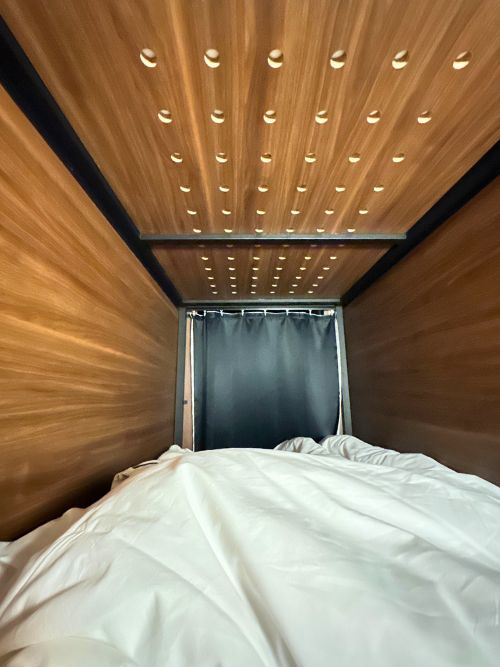
The Budget Hostel
Prior to the party hostel experience, I was mostly staying in budget hostels, which are surprisingly close in price to party hostels. Depending on where they’re located, they range in price from 20 to 40 euros. If you’re looking at more expensive destinations like Switzerland or Iceland, expect to pay more.
They come in all kinds of room sizes, some that accommodate 2 people all the way to some that accommodate 12 people. I have stayed in a 4, 6, 8, 10, and 12-person rooms. If you want fewer people, expect to pay more. I preferred fewer people because there’s generally less commotion and it’s easier to make group decisions (like when the lights go out).
Budget hostels provide you with sheets, pillows, and lockers but not much else. You have to bring your own soap and your own towel (or rent one at reception usually costing 2-4 euros). Most of the budget hostels I stayed at didn’t have restaurants or elevators, so be prepared for that as well. And most tend to be a little further outside of the city. Usually, the people at reception are friendly and will recommend restaurants and things to do during the day.
I didn’t mind my experience at budget hostels, besides some of the larger groups because they tended to be noisy. From here on out I might pay a few extra euros to have fewer people.
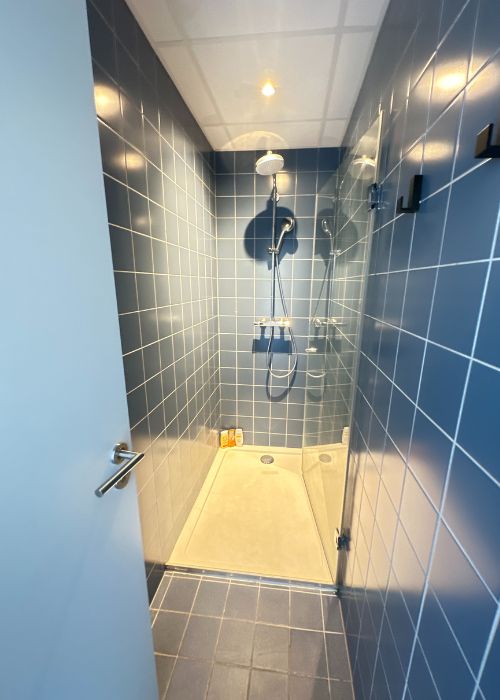
The Luxury Hostel
Although I’ve never stayed in a luxury hostel, the closest I got was my time in Bordeaux. Although partially under construction, it was beautifully maintained and had some really nice amenities. After dealing with some frustrating showers, it was glorious encountering a huge rain shower with great light and space. I never wanted to leave.
Those beds were interesting because it felt a little more like I was sleeping in a cabinet, not necessarily in a bad way. I crawled into the narrow bed which had walls on three of the four sides, with a privacy curtain at the end. I liked this because it felt cozy, and the noise and lights of fellow guests didn’t bother me. It helped that there were only 3 other guests.
There was not much space outside each cabinet which wasn’t ideal. This was made up for by the nice restaurant, an elevator, and a rooftop pool and bar.
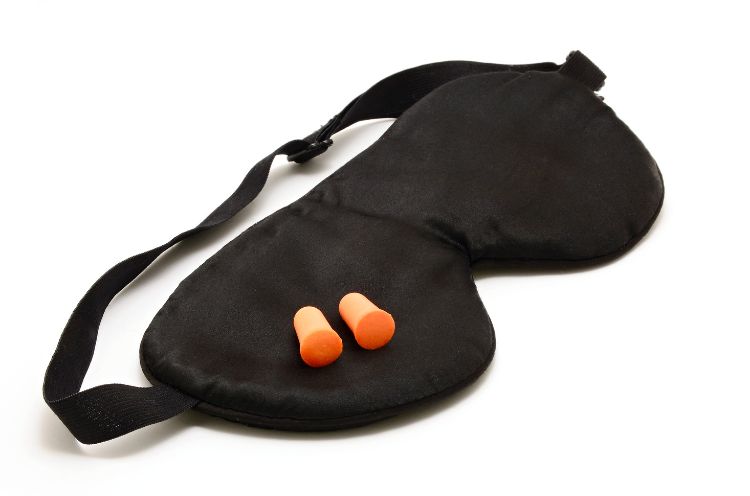
What to Bring to a Hostel
I tend to be on the introverted side, so sometimes the idea of sharing a room with a bunch of strangers sounds like hell on earth. To avoid burnout, it’s super important to listen to your body and rest when you need to in addition to finding any kind of privacy available. I’ve found ways to “create my own privacy” which allows me to relax in a foreign space around new people. My favorite pieces of equipment:
Other Things to Bring to a Hostel
- Flip flops (for showering)
- Travel towel (usually available for free or for rent at hostels if you can’t fit it in your suitcase)
- Shower Supplies (body wash is sometimes available but I advise bringing your own)
- Dry bag (to keep your things dry when showering)
- Power adapter
View our Hostel Essentials List Here
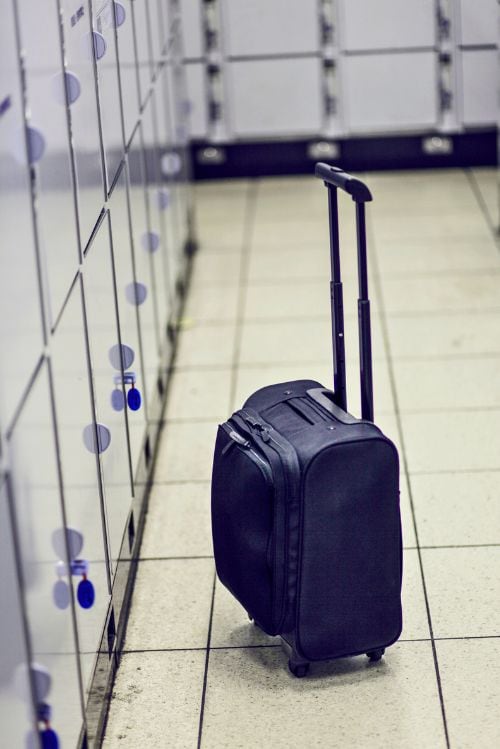
Hostel Safety
As a solo female traveler, I personally always look for hostels that offer female-only dorms. I’ve had two experiences with mixed dorms and both times it was just me and a bunch of men. It was fine but I definitely was more on guard and never felt truly relaxed. Female-only dorms are usually the same price as mixed dorms or are slightly more expensive. It’s worth it for my safety and peace of mind. Do whatever works for you.
The first few nights I stayed in hostels, I was hyper-paranoid about my belongings. I didn’t know if I should lock everything up, hide everything or what the general etiquette was for sharing a space. More times than not, everyone else at a hostel is there for a peaceful night’s sleep and wouldn’t want to steal your stuff. However, this is always a possibility. I err on the side of caution when it comes to my valuables such as my laptop and other electronics. I have locks for my bags but most hostels offer locker storage as well. Lockers can’t always accommodate larger suitcases but are good for storing the smaller things you want to keep safe.
Always read reviews before booking hostels. I always book hostels with a 7/10 rating and above. On Hostelworld, they also have a security rating which is important to check before booking. I also book places with 24-hour reception so if there’s ever a safety issue you can get immediate help. I also do a little research to make sure the surrounding neighborhood is safe, too.
Read More: Why You Need International Travel Insurance When You Travel
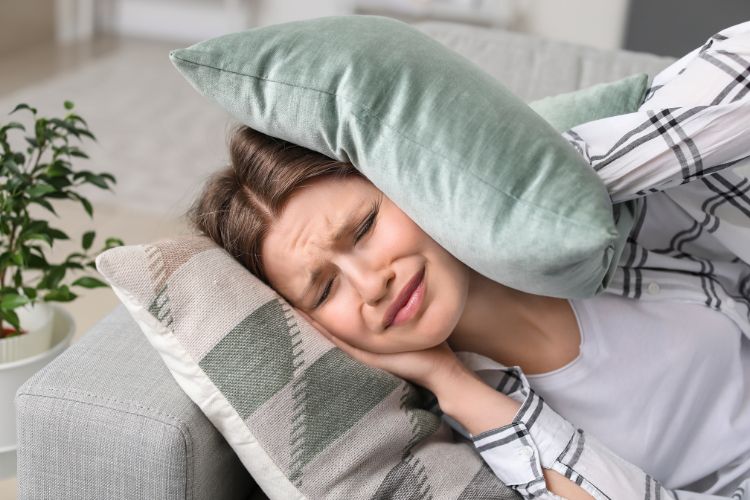
Sleeping and Situations Outside of Your Control
I used to be one of the lightest, pickiest sleepers on earth. After years of enduring a wide variety of horrendous sleeping arrangements, I have come up with my own survival tips for staying sane while getting a good night’s rest.
Sounds
Hostels are a breeding ground for unpleasant sounds. When you’re sleeping in a room with 2-9 other people, odds are the night won’t be silent. You got your three basic sound categories: voices, environmental noises, and the dreaded bodily noises.
You’d be surprised by how many people lack the basic courtesy to refrain from talking out loud in a room full of sleeping people at 3 am. Whether they are simply ignorant to how they’re being perceived or, worse yet, they don’t care, you will find a couple of these types at every hostel.
Of course, there are also people who have to leave at 5 am and forgot to pack the night before (guilty), so there’s the inevitable cacophony of zippers. Sometimes there are plumbing noises and music from the bar next door and early morning construction.
And my personal favorite: coughing, sneezing, snoring and farting. I kid you not, I have laid awake on my bottom bunk stifling laughter because of an endless symphony of farts. It was one after the other as if it was meticulously orchestrated. My arch nemesis is snoring, regularly causing my brain to short-circuit. It triggers a primal rage in my brain that makes it impossible to sleep. Something about rhythmic choking just gets to my head. Sorry snorers.
All of these have a marvelous solution. You guessed it – earplugs. I never liked earplugs because they always fell out and they kind of made my head feel stuffy. However, out of desperation, I had to give them another chance. Now they save my sleep. Buy a whole package of these bad boys. They’re absolutely a necessity.
Sights
It’s hard to find privacy within hostels. Some people will happily display their belongings, while others are tidy. Some people have no problem with changing in front of other people, while others do. Regardless, these are just the realities you have to get used to in hostel life.
In terms of lighting, sometimes I’ve walked into a hostel room at 8 pm and there were people sleeping with the lights off. Other times, the lights don’t get turned off until 1 am. This is dependent on who you’re staying with. Most hostel beds are equipped with personal lights. Usually, quiet hours are at 10 pm so I deem that an appropriate time to turn off the overhead light (if everyone is in agreement).
Some hostels have blackout curtains so no matter what time it is in the morning, the room won’t be lit up until the last person is awake( sometimes as late as noon). This means you have to learn the art of getting ready and packing with only the light from your phone. This requires practice. The best way I found is to deep squat while holding your phone between your knees, and shuffling around collecting your belongings. Amateurs accidentally strobe the whole room which results in inevitable sighs and complaints.
Read More: How to Pack Lightly for Any Length Trip Abroad
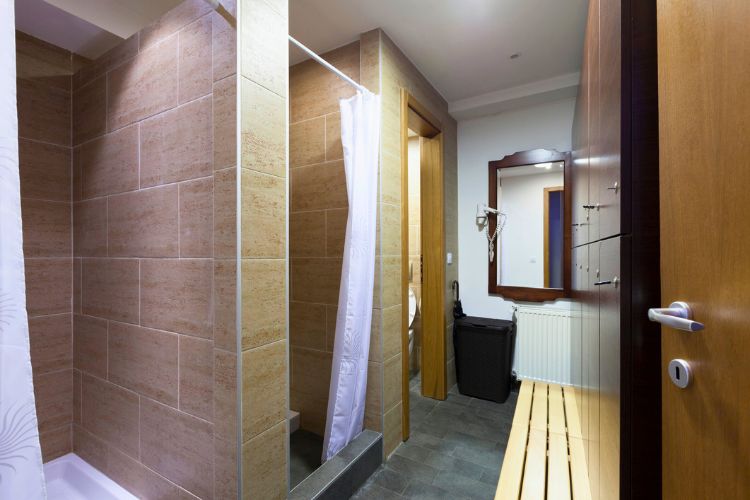
Conditions
Temperature can be another challenging one. I typically like to sleep in cold rooms, but Europe isn’t known for its AC. Most nights I’ve been fine, but one night in particular was brutal.
I was on a top bunk (not my favorite but I had no choice) and it was extra stuffy and hot up there. I remember feeling panicked and suffocated throughout the night. Luckily I was able to remedy this by filling up my water bottle periodically with cold water and resting it on my forehead or wherever needed cooling off.
Some hostels assign beds, others let you choose. I’m never thrilled when I’m assigned the top bunk due to accessibility reasons (ladders are difficult sometimes) and as said before, the heat. Most of the time I just suck it up because I don’t have much of a choice.
There are a variety of bathroom situations at hostels. Some bathrooms are attached to the dorm and are shared by whoever is staying in that room. Others are community-style bathrooms. If there is only one shower stall for a whole room, it’s generally courteous to not take an absurdly long shower. Just be mindful of the time you spend occupying shared spaces.
Some showers don’t have any temperature control while some are decked out with all the bells and whistles. Some require you to periodically click the “shower button” to keep the water running. Shelf space and hooks are also a gamble which is why I recommend bringing a dry bag.
Hostel Etiquette
I had an experience staying in a hostel where I had an unpleasant batch of roommates. I was sharing a room with 11 other girls and 4 of them were babbling and giggling at full volume far past the designated quiet hours. It was clear that almost everyone else in the room was trying to sleep.
The most annoying part was that there was a whole bar and lounge that they could’ve relocated to if they wanted to talk longer. I was quietly fuming in my bed hoping someone else would take one for the team and tell them to shut up. To my delight, someone said exactly what my thoughts were and I was grateful I didn’t have to be the one to do it.
However, in these circumstances, I learned it’s okay to ask people to be quieter. They can go elsewhere if they want to socialize. It’s perfectly okay to protect your sleep, which everyone there signed up to do in the first place. Regardless, those girls inspired my purchase of earplugs.

Are Hostels For You?
I’m a pretty resilient traveler, especially because I don’t have a lot of money at my disposal. I’m perfectly content flying with a budget airline with my legs crunched into the back of the seat in front of me. I know I’m not at the stage in my life where I can afford luxury and to me, that’s perfectly fine. I adapt and still make the most out of the time I have.
Hostels are Not for You If:
- You’re picky with your accommodations and have high standards
- You don’t want to share rooms with other people*
- You aren’t interested in the social aspect of a hostel
- You aren’t fond of being around young travelers (some can be rowdy)
- You don’t like the idea of communal bathrooms
- You want a guaranteed comfortable sleeping arrangement
- You want control over temperature, lights, and sounds
- You require more space
*As a side note, there are many hostels that do offer private rooms. Although more expensive than staying in a dorm, they are often much cheaper than hotel rooms. Some have shared bathrooms, some have private bathrooms. Each has different amenities. If you do want your own space but don’t want to spend the money on a hotel room, it’s worth trying a private room at a hostel.
My Hostel Recommendations
Currently, there are some great Black Friday deals on Hostelworld, so it’s a great time to book.
- Onefam Les Corts in Barcelona, Spain (Can’t go wrong with any of the Onefam hostels – they’re all over Europe)
- Whole Wide World Hostel & Bar in Zagreb, Croatia
- Balmer’s Hotel in Interlaken, Switzerland (Go World Travel Founder’s favorite)
- Jost in Bordeaux, France
- Combo Bologna in Bologna, Italy
- Anda Venice in Venice, Italy
Conclusion
All things considered, I think hostels are a wonderful option for travel accommodations. They not only allow people to see the world on a budget but they’re a great place to make friends. Even the not-so-great ones come with stories, which in my opinion is part of what travel is all about. I recommend hostels to anyone who’s willing, but I can’t reiterate enough that they’re not for the weak. I hope this article helped you understand not only how to survive in a hostel, but thrive and make the most out of your experience.
Read More:
- Summer in Cherry Creek North: Denver’s Upscale Urban Oasis - June 26, 2025
- Switzerland Bucket List: 10 Epic Adventures You Can’t Miss - June 17, 2025
- 10 Best Places to Spend the Fourth of July in the USA - June 16, 2025

